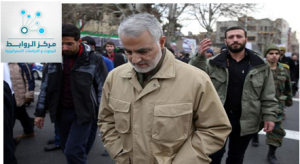The assassination of General Qasem Soleimani by an American military operation in Iraq can be considered a major climax in the “barometer” of the complicated relations between the United States of America and Iran, and it may mark the end of the phenomenon that started with the invasion of Iraq by the American forces in 2003, in which the two sides contributed to building the confrontation against common enemies, starting with Saddam Hussein’s regime, which Iran considered its existential opponent, and went through the Iraqi resistance to the occupation (which the Sunnis formed its social incubator), ending with the struggle with the Al-Qaeda organization and its successor, ISIS.
The killing of General Qasem Soleimani with an American strike, this morning, Friday, has a thunderous effect in Washington not in terms of its horror, but rather in terms of fear and fright from its serious consequences of his assassination.
And what increase the feeling of the danger of this qualitative escalation and its repercussions that the American administration was quick to claim responsibility for his death, as if it had declared war by that, or at least opened the confrontation with Tehran to its extent, including the possibility of extensive clashes with it, even if it remained without invasion and invasion and attack .
The killing of Soleimani in Iraq signals a new stage of the US-Iranian conflict. Iranian Supreme Leader Ali Khamenei has defied US President Donald Trump that he will do nothing in response to the attack on the US embassy in Iraq, but the betting on the weakness of the Americans has entered the region today in new equations ending the rules of engagement and sharing of influence in the conflict areas between the two parties.
The ball is now in Khamenei’s court to determine the timing, size and location of the retaliation strike, especially as Tehran does not want to give the impression that it is weak or in a defensive position. America has changed the rules of the game in Iraq, and Iran has shifted from its preference for proxy wars to direct targeting of its military and political arm in the region. The US military possesses the air superiority of deterrence, while the Iranian regime has a list of American targets in the region that can be hit if it chooses to escalate. America has abandoned its defensive posture and informed those concerned that its abandonment of the Gulf and Kurdish allies does not mean that its influence is declining in the region.
With the elimination of Soleimani, a hair was cut between Washington and Tehran, as the Iranian regime will read Soleimani’s removal from the scene as a target for its presence, as the man is a basic pillar in the regime.
The Americans know that Soleimani ranks No. 2 in government, and it is known that previous administrations (Bush and Obama) have abandoned the option of assassinating him on more than one occasion, “in order not to blow up bridges with Tehran and move massive reactions against it that it doesn’t need.”
Amid this unprecedented escalation, questions remain open and surrounded by a lot of ambiguity, the first of which revolves around whether the administration has taken a step with this weight without preparing to deal with its retaliation, as it did in bombing the bases of the Iraqi Hezbollah, without anticipating the consequences represented by storming the embassy, and the second question: What is the purpose of publicly adopting the killing of Soleimani? Does the administration consider the declaration a deterrent factor, or has it deliberately publicized to ensure the escalation continues and deepens the confrontation? Did it decide to proceed with the option of toppling the Iranian regime?
No less important than the question regarding the effects of this operation on US-Iraqi relations, as Baghdad, which found itself yesterday between the tambourine and the nail in the embassy operation, will be in more difficult position to secure a balance from the two sworn partners in the Iraqi arena? Another more serious question related to the fate of the Iranian nuclear file, which is expected to return to before the 2015 agreement? All these questions are waiting for answers in a phase where the situation gets out of control .
The assassination of Soleimani , in this great historical context of major events and detours in the course of relations between Iran and the United States, heralds major developments in the confrontation between them, and perhaps an unprecedented escalation, but the large scale of the strike could also push Tehran to review its accounts and rearrange its priorities.
Iran’s large stretches in the Arab region and the world make its possible response difficult to speculate, but it will most likely hesitate to call on the Lebanese “Hezbollah” to respond, especially after losing much of its political influence in the wake of the ongoing Lebanese uprising, and a response in the waters of the Arabian Gulf may call for a counter-response transports the confrontation into its territory, and it is therefore most likely that it will use its large reservoir of Iraqi militias. Thus, the Iraqis will bear, once again, the consequences of a battle that harms them, and may contribute to aborting the existing popular revolution.
Iranian Studies Unit
Rawabet Center for Research and Strategic Studies

